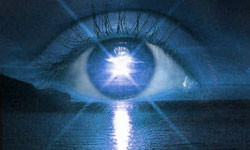I’m going to start stepping on some toes by making some posts about the convoluted stuff that has become kind of standard in the material on improving vision with the Bates method, as presented in various books or by various people.
The first thing I want to talk about is the idea of relaxation.
Some books on the Bates method put so much emphasis on avoiding strain or effort at all costs, and people get the idea that they should not be involved in an active process of trying to see. Bates’s writings as well repeatedly went back to this as a main point. And he wasn’t wrong. But people have misinterpreted it to be the be-all and end-all of the way to see clearly and gone on to come up with all kinds of ways to relax their eye muscles, with the idea that if they can just find a way deep within their souls to relax that last bit of tension, whether pent-up emotion or how ever they may think of the root cause of the problem of chronically tense eye muscles as, they will get and retain clear vision thereafter. Facial massages and anything else to help relieve mental and physical tension is fine in a certain context. But people have used the idea of relaxation to justify just about anything on a slippery slope that they like doing, whether it’s bubble baths, playing football or gardening, with, again, the idea that they just need to somehow relax more and find more inner mental tension to release just by doing things that they might describe as relaxing.
Now you have to understand that in Dr. Bates’s day, Western culture didn’t include ideas like stress-related disorders or meditation. Describing it like he did was the best way he knew how given the contemporary usage of the words and his desire to reach the masses, not just appeal to scientists and other thinking types of people who might grasp some complex but more accurate explanations.
The idea of relaxation has its important place. There’s a valid and important point about not tensing your facial muscles or doing anything that might be called clenching your eyes in order to force them to see. No doubt people carry a great deal of tension in those areas, and on down to the neck and shoulders, and it all does seem to affect the vision. There are physical and mental things you can to help relieve tension, but understand that it wouldn’t be there in the first place if something weren’t wrong. It isn’t just there because you haven’t yet told it to relax. It’s there for a reason.
Misusing the visual system has, for some strange reason, a relationship with chronic tension in other areas of your body. People find that when they have sudden periods of clear vision as a result of practicing the Bates method, their shoulders may suddenly loosen, their face may feel different, their hearing may even change, and other stuff that’s hard to come up with a concrete explanation for. In short, it’s plenty obvious that fixing vision somehow has a beneficial effect outside the visual system. So beyond any muscular tension that you can find a way to mentally release or physically manipulate to release, you really don’t need to be wasting your time on an arcane journey of relaxation. Using your visual system correctly is going to have the effect of stopping any remaining tension in the area of your eyes that you can feel but don’t know how to release.
People have come with a lot of ways to relax their eyes somewhat, but they do it at the cost of being disconnected from the process of seeing and might do alright until they open their eyes and do something, at which point they’re totally struggling. That pattern of anxiously grabbing large chunks of things you see is only anxious when it’s done in large chunks. The smaller your point of attention, when done correctly promotes so much focused calmness that it leaves no place for anxiety. And any anxiety is sometimes released from your body and brought to your conscious mind, seemingly out of nowhere.
But what people do is become so completely detached from their process of seeing, fearing that they will just generate more tension if they “try” to see anything (lots of material suggests that any “effort” to see worsens vision), that they go around constantly trying to NOT see, to NOT look at anything, and continuing to do the very thing with their eyes that’s causing the tension. It’s kind of understandable what leads you to that: You feel the tension stronger when you first try to look at something small. The tension is revealed more acutely then, so you avoid the whole issue by not doing it. But it’s the only way you can face it and be honest about what all is really happening. What are you really doing when you look at a small point? Are you applying the right way to look among points, or are you assuming it can’t be done consciously and abdicating control?
The bottom line is you love what helps suppress yourself, and you hate what helps reveal who you have become. It’s all backwards. So you love doing what doesn’t actually help you here. Facing completely the way you see isn’t fun, but it’s rewarding.
get help on our Facebook Group!

I founded iblindness.org in 2002 as I began reading books on the Bates Method and became interested in vision improvement. I believe that everyone who is motivated can identify the roots of their vision problems and apply behavioral changes to solve them.
